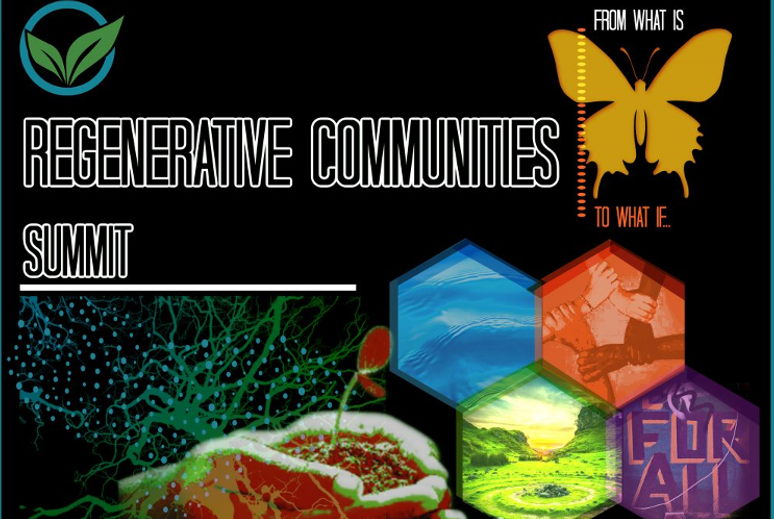As I hope you’re already aware, Transition US will be co-hosting an online Regenerative Communities Summit starting September 24th with dozens of partner organizations and networks representing a growing “movement of movements” for a just, resilient, and regenerative future. Over the course of two and a half weeks, participants will be able to choose from more than 40 inspiring and transformational “main stage” events, sign up to host their own sessions, and connect directly with each other via our Mighty Networks platform. Because we don’t want cost to be a barrier for anyone, we’re making all of this available on a pay-what-you-can basis and inviting our youth and BIPOC friends to attend for free.
I could go on and on about all of the amazing, top-notch speakers who will be joining us and the diversity of topics we will be exploring, but since you can easily find this information yourself at https://transitionus.org/summit, I want to focus here on the deeper questions of why we are holding this Summit at all, why it’s not just another conference, and why you should make a special effort to attend.

For many of us over the past 18 months, the coronavirus pandemic has upended our lives, put exciting plans on hold, and kept us separated from one and other. However, it’s also given us ample time to reflect on who we want to be in this moment of urgent civilizational crisis. As unprecedented climate disasters have ravaged our country, Black Lives Matter protestors marched in the streets, and insurrectionists scaled the walls of the Capitol, more and more of us have been waking up to the realization that we simply can’t go back to normal.
As a result, you may currently find yourself searching for a new path forward, something you can authentically believe in and commit yourself to. Or you may already have a clear vision for the work you want to pursue, but are looking for additional partners to provide support and solidarity. Or you might even feel that you have a useful resource, model, or idea you want to share with your fellow activists and organizers. Wherever you’re at in the process and whatever you’re bringing with you, there’s a place for you at this Summit.

We’ve designed it intentionally to offer a mix of spaces for learning, reflection, conversation, networking, brainstorming, and action planning. And inspired by Transition Movement founder Rob Hopkins’ recent work, we’ve organized sessions to trace an arc from “What Is” to “What If” to “What’s Next.” Our hope is that this arc will help to guide participants on their own journeys from grappling with the monumental challenges we’re currently facing, to envisioning the more beautiful world we can create together, to determining how best to direct our energies, skills, and talents moving forward.
In the face of rising inequality, political instability, and climate chaos, millions of us who care deeply about the fate of our communities and the legacy we’re leaving behind for future generations, but who have been mostly watching from the sidelines so far, need to find a way to get in the game. Likewise, those of us who have been involved in regeneration for years or decades need to recharge and figure out how to redouble our efforts if we are to rise to meet the challenges of our times. Both groups will find plenty of encouragement, support, and resources at this Summit to help them to do just that.

Admittedly, our individual actions, by themselves, don’t amount to much. However, when we link them together, as we are doing at this Summit, they have the potential to become much more visible to the general public and have a much greater impact on the trajectory of our collective future. Although many Transitioners and Permaculturalists, social justice activists and environmentalists, local food system cultivators, solidarity economy organizers, and renewable energy advocates have long toiled in relative obscurity with minimal resources, we have a powerful opportunity right now to change that. c
While this Summit is an important start, I have gradually come to see it primarily as a launching pad for scaling up regenerative efforts throughout this country and around the world over the next several years. For its part, Transition US will be launching a new, multi-faceted “Regeneration Nation” campaign at this Summit that will seek to make the regenerative vision universally known as an attractive, accessible, and viable alternative to the status quo.

The possibilities we have at this particular moment for stepping into a greater sense of purpose and helping to unleash widespread, systemic transformation are immense – as are the risks and dangers we face if we fail to do so. In this time of reemergence, with all its fits and starts, this Regenerative Communities Summit is definitely not just another conference. It is an opportunity to (re)claim our power and demonstrate that a better world is not only possible, it is already well on its way.
So will I see you at the Summit? I certainly hope so. Again, to learn more and register, please visit https://transitionus.org/summit.





